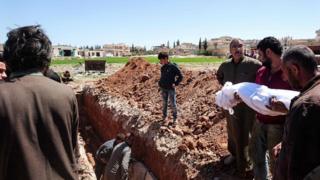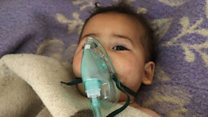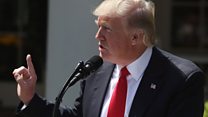 Image copyright
Image copyright
AFP
Funerals for victims were held in Idlib province on Wednesday
The Syrian foreign minister has set out conditions for any UN investigation into the deaths of dozens of people from a chemical agent on Tuesday.
Walid Muallem told the BBC it would have to be non-political, involve “many countries” and “start from Damascus” before his government could accept.
He denied Syria had dropped chemical weapons from the air, despite facing widespread scepticism.
The UN’s child agency has confirmed that at least 27 children were killed.
A UK-based monitoring group, the Syrian Observatory for Human Rights, reported earlier that 86 people had died in the chemical incident in Khan Sheikhoun, Idlib province.
Russia, one of Syrian President Bashar al-Assad’s few allies, was challenged by the US and UK at the UN Security Council on Wednesday when it sought to argue the mass poisoning had been caused by the rebels’ own chemical weapons.
Washington has hinted it might change its policy towards Syria in response to the deaths.
What do we know about the deaths?
Warplanes attacked Khan Sheikhoun, about 50km (30 miles) south of the city of Idlib, early on Tuesday, when many people were asleep, witnesses and activists say.

According to Unicef, at least 27 children were killed and a further 546 people, among them many children, were injured.
Evidence has mounted that the victims were killed with a nerve agent, probably Sarin.
Medical charity MSF, whose staff treated the injured, said some had symptoms consistent with such exposure.
Turkish Foreign Minister Bekir Bozdag said on Thursday that autopsies had confirmed that chemical weapons were used.
- Images of dead children spread over social media
- Aftermath of attack in pictures (Warning: graphic images)
What is the Assad government’s position?
Foreign Minister Muallem told BBC Arabic his government would, together with Russia, consider accepting an investigation mandated by the UN Security Council, if its conditions were met.
Speaking separately at a news conference, he accused Islamist militant groups not party to a ceasefire brokered by Russia and Turkey of storing “chemical weapons in urban and residential areas”.
The Russian military confirmed on Wednesday that the Syrian air force had launched air strikes in the Khan Sheikhoun area but said they had set off chemical weapons being stored by rebels.
How plausible is the Russian version of events?
Hamish de Bretton-Gordon, a former commanding officer of the British Armed Forces Joint Chemical Biological Radiological Nuclear Regiment, told the BBC it was “pretty fanciful”.
“Axiomatically, if you blow up Sarin, you destroy it,” he said.
“It’s very clear it’s a Sarin attack. The view that it’s an al-Qaeda or rebel stockpile of Sarin that’s been blown up in an explosion, I think is completely unsustainable and completely untrue.”
Hasan Haj Ali, commander of the Free Idlib Army rebel group, told Reuters news agency: “Everyone saw the plane while it was bombing with gas.”
Will America intervene at last?
Mr Trump said on Wednesday: “I will tell you, it’s already happened, that my attitude towards Syria and Assad has changed very much… You’re now talking about a whole different level.”
However, he did not give any further details.

It came only days after the US ambassador to the UN, Nikki Haley, said the US no longer prioritised the removal of President Assad – a shift in US policy from the Obama era.
Mr Trump has been promising a new strategy for Syria and Iraq and there have been some increases in troop numbers but this latest development will increase the pressure for more decisive action, the BBC’s Gary O’Donoghue reports from Washington.
Has Assad used chemical weapons before?
The Syrian government was accused by Western powers of firing rockets filled with Sarin at Ghouta, Damascus, killing hundreds of people in August 2013.
President Assad denied the charge, blaming rebel fighters, but he did subsequently agree to destroy Syria’s chemical arsenal.
Despite that, the Organisation for the Prohibition of Chemical Weapons has continued to document the use of toxic chemicals in attacks in Syria.
What are the chances of peace?
More than 250,000 people have been killed in Syria’s civil war and, after more than six years, no political solution to the fighting is in sight.
A ceasefire brokered by Russia and Turkey at the end of last year does not apply to some Islamist groups like Jabhat Fateh al-Sham and Islamic State or Kurdish militants.
The UN humanitarian adviser on Syria, Jan Egeland, has called for a 77-hour ceasefire in order to deliver aid to besieged areas.
“A war where children suffocate to death because of toxic chemicals is a very, very dirty war,” he said.
Syria chemical ‘attack’: Damascus attaches conditions to UN inquiry

